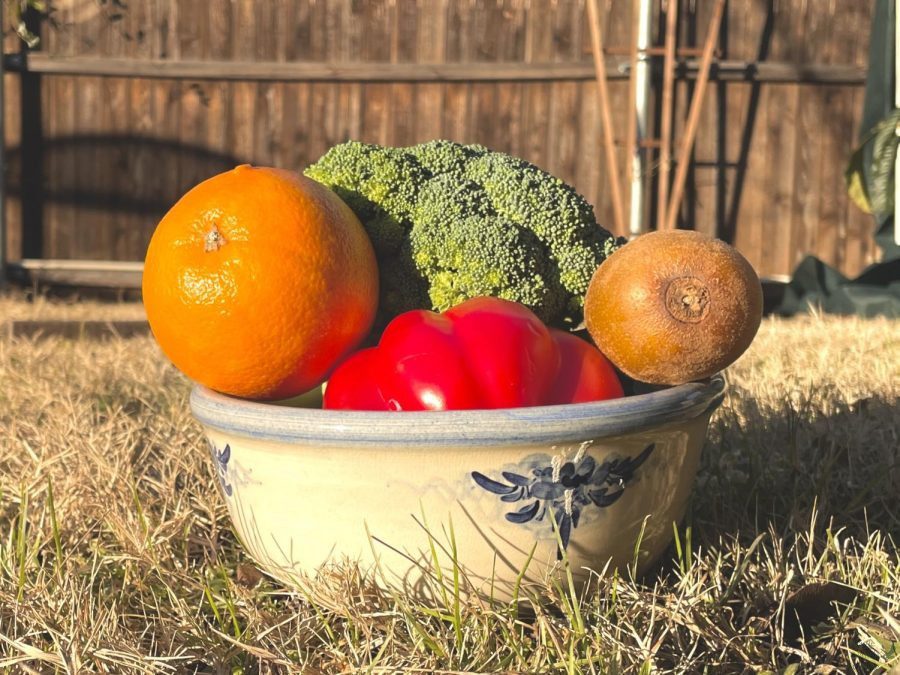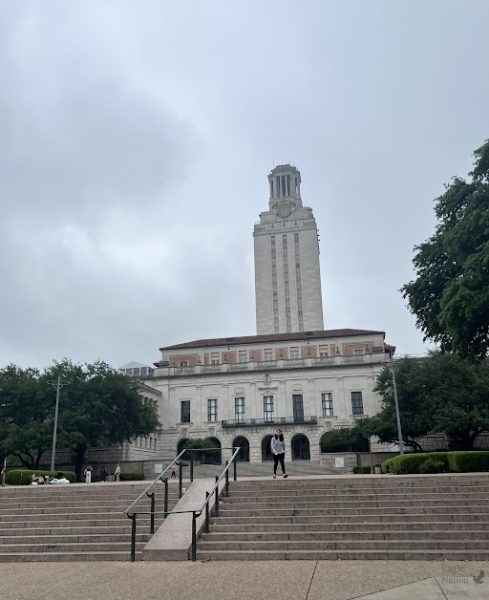Opinion: Grow-your-own-food movement increases self-sufficiency for Americans
Above, fruits and vegetables sit in a bowl in the sun. The Grow-your-own-food movement, also known as the “Grow Your Own Movement,” has always existed, but the COVID-19 pandemic has seen it grow more rapidly than before. Due to product shortages, people are becoming more interested in being self-sustainable and growing their own fruits and veggies.
Self-sufficiency: The buzzword of the pandemic.
Starting from the toilet-paper-hoarding era, people have scrambled to make sure that they can survive when supply runs out. Almost two years later, it’s still hard to find cleaning products at the local Kroger. The food industry hasn’t escaped panicking customers – it’s not rare to find aisles empty after another wave of the virus hits – especially now that the COVID-19 Omicron variant has become a new danger for U.S. residents.
A large part of our population doesn’t have access to a grocery store at all. An estimated 19 million people, or 6.2% of the U.S. population, lives more than one mile for an urban area, or greater than 10 miles for a rural area, from the nearest supermarket. Perhaps, an even more stark number, 2.1 million households both live in a food desert and lack access to a vehicle.
The grow-your-own-food movement, also known as the “Grow Your Own Movement,” has been around for a while, but the pandemic has seen it grow rapidly. Due to product shortages, people are becoming more interested in being self-sustainable and growing their own fruits and veggies. Gardening can help keep food fresh, nutritious and readily available – more so than if it was from a grocery store.
Vincennes University is embracing the movement: they’ve just added a new horticulture course for students interested in urban food production.
“Food travels from who knows where, probably California, in the trucks on the way here,” horticulture instructor Jennifer Nettles said. “After it’s been picked, and traveled and sitting in the grocery store, maybe it’s been sitting in your own refrigerator for a few days – that nutrient content has declined.”
People have created small businesses to help the nation out through Grow-Your-Own kits – take-home kits designed to help the customer grow their own produce at home. Back to the Roots has launched organic indoor gardening kits to help alleviate food insecurity and let Americans take back control of their own food. A few years into farming and selling their fresh produce to grocery stores, founders Nikhil Arora and Alejandro Velez decided to make healthy food more accessible to ever-growing urban populations, where access to green space often reflects wider class and racial divides.
Self-sufficiency through growing your own food has a lot of benefits. Knowing where your food is coming from helps avoid health concerns such as heart disease, high cholesterol and preservatives. It also allows you to avoid pesticides and grow clean, green, organic food from your backyard. Many store-bought vegetables such as spinach, peppers, celery, and tomatoes contain high amounts of pesticides.
For beginners, Arora recommends starting with quick-germinating and fast-growing veggies, such as cucumbers, peas, beans, or cherry tomatoes, which grow year-round and indoors.
Besides the multiple health benefits growing your own food provides, gardening can help foster a sense of connection with your roots and family history. Gardening connects people to the land, to their community and to our history as humans of being hands deep in dirt, gardening to grow fresh food for our families.
Ron Finley, of the Ron Finley Project, said that “growing your own food is like printing your own money.” His work specifically addresses the fact that the socio-economic environment can be a barrier to basic nutrition – fresh, nourishing food. Knowledge on how to produce one’s own food assists people living in less fortunate areas to be more economically self-sufficient.
Supporters of the “Grow Your Own Movement” even say that gardening has helped them feel less anxious in their day-to-day lives.
According to L.Be Sholar, founder of Farm-Based Foodie, “People in the city are very, very disconnected, especially where I was working; they were quite neurotic because they weren’t grounded. I eventually started to crave a connection to something beyond my concrete surroundings.”
Sholar launched a business called Farm-Based Foodie in 2018 after she realized gardening was helping her mental health. Farm-Based Foodie sells mobile “pop-up” gardens. Starting at $99, these kits come with seeds, instructions for plant care and cards with farm-to-table recipes. Extension gardens are also available, along with trellises for tomato growing.
Sholar claims that her mobile gardens are environmentally friendly and make gardening accessible, as they are free of single-use plastics. Each kit is equipped with reusable carbon-negative soil, which sequesters carbon more than traditional potting mixes or compost.
Tips and benefits for growing your own food at home:
- Raised beds and vertical gardening can help maximize space in a garden so you can grow as much as possible in a small space.
- Seeds and pots can be found for cheap at a local plant nursery. For example, Northhaven Gardens, a large plant nursery in North Dallas.
- Container gardening is excellent if you have limited space – you can grow almost any kind of vegetable in a container.
- Gardening increases muscle strength. Working in your yard keeps your hands and fingers strong.
- Vegetables that ripen in your garden have greater nutritional value than store-bought produce.
- Working in the sun is a great way to get a healthy dose of vitamin D into your body. Vitamin D increases the calcium levels in the body, which benefits your immune system and your bones.
- Families who grow their own food will significantly reduce their grocery expenses. Kitchen gardens are especially helpful for low-income populations. According to one estimate, a family that invests $25 in their kitchen garden could expect to save nearly $500 per year on groceries.
- The fruits and vegetables from your own garden will always be fresh, as opposed to grocery store produce that can be weeks or months old.
- Turnips, leeks, cherry tomatoes, garlic, hybrid tomatoes, herbs, spinach, heirloom tomatoes, and winter squash are the easiest and cheapest vegetables to grow at home.
The trend of home gardening through the “Grow Your Own Movement” has led people to appreciate the beauty of home-grown food. Learning to eat in-season food, growing your favorite varieties and getting healthy exercise along with your daily dose of sunlight through something productive are all things that benefit the modern American. With all of the technology that we’ve created in the last few decades, sometimes it’s important to take a step backward and explore our roots.
Your donation will support the student journalists of Prosper High School. Your contribution will allow us to purchase equipment and cover our annual website hosting costs.

Honors, Experience and Awards:
5 Best of Sno publications.
5th place in Copy Editing, district UIL meet 2021
Honorable mention- Podcast interview, 2021 TAJE Fall Fiesta
UIL Journalist 2020-2021, 2021-2022
Quill and Scroll Society member 2021-2022
1st place in Copy Editing for CENTEX UIL meet 2021-2022
3rd place in Copy Editing for Aubrey UIL meet 2022
2nd place in Copy Editing for NorTex UIL District meet 2022
National Silver award for poetry from the Scholastic Art & Writing organization
National Recognition Award from College Board
AP Scholar with Distinction Award
2 Best in Texas News & Broadcast Awards, 2022: Personal Opinion Column- Honorable Mention, News Story- Honorable Mention
President of the Classic Book Club, 2020-onwards
Member of the National Spanish Honors Society (NSHS)
PHS Award for Academic Excellence in Newspaper II, 2022
Dean’s Scholarship for Cornell University Pre -College Program
Sibley Scholarship for Brown University Pre -College Program
CIEE Global Navigator Scholarship













